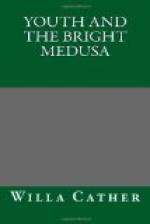The first member of Cressida’s party with whom I had speech was Mr. Poppas. When we were two hours out I came upon him in the act of dropping overboard a steamer cushion made of American flags. Cressida never sailed, I think, that one of these vivid comforts of travel did not reach her at the dock. Poppas recognized me just as the striped object left his hand. He was standing with his arm still extended over the rail, his fingers contemptuously sprung back. “Lest we forget!” he said with a shrug. “Does Madame Cressida know we are to have the pleasure of your company for this voyage?” He spoke deliberate, grammatical English—he despised the American rendering of the language—but there was an indescribably foreign quality in his voice,—a something muted; and though he aspirated his “th’s” with such conscientious thoroughness, there was always the thud of a “d” in them. Poppas stood before me in a short, tightly buttoned grey coat and cap, exactly the colour of his greyish skin and hair and waxed moustache; a monocle on a very wide black ribbon dangled over his chest. As to his age, I could not offer a conjecture. In the twelve years I had known his thin lupine face behind Cressida’s shoulder, it had not changed. I was used to his cold, supercilious manner, to his alarming, deep-set eyes,—very close together, in colour a yellowish green, and always gleaming with something like defeated fury, as if he were actually on the point of having it out with you, or with the world, at last.
I asked him if Cressida had engagements in London.
“Quite so; the Manchester Festival, some concerts at Queen’s Hall, and the Opera at Covent Garden; a rather special production of the operas of Mozart. That she can still do quite well,—which is not at all, of course, what we might have expected, and only goes to show that our Madame Cressida is now, as always, a charming exception to rules.” Poppas’ tone about his client was consistently patronizing, and he was always trying to draw one into a conspiracy of two, based on a mutual understanding of her shortcomings.




